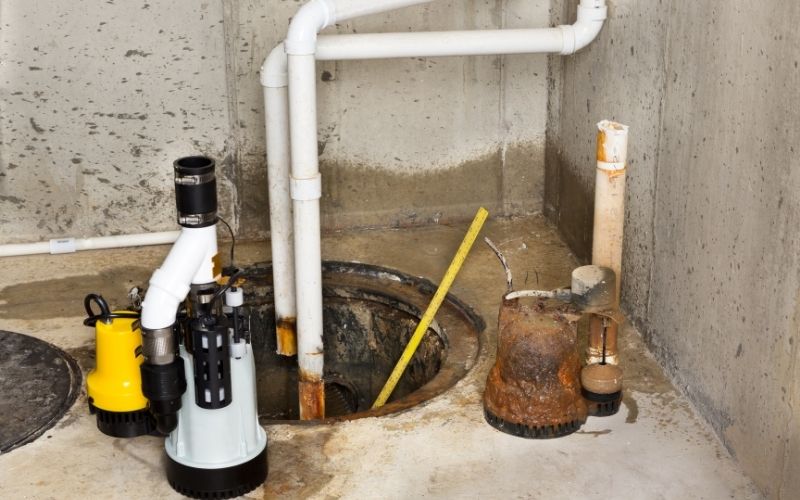Your sump pump can be a lifesaver in the event of a flooded basement. But what if the storm that causes the flooding also knocks out your power?
Sump pumps are generally hooked into your home’s electrical system. That means even a momentary power outage during a storm can lead to some serious water damage in your basement.
One option is to install a battery-operated backup sump pump, but it is expensive and may not be compatible with your existing sump pump. For those who need a simpler or cheaper option, why not connect your sump pump directly to a battery?
Specifically, you may be wondering if you can use a marine battery to run your sump pump. Is switching to battery power during an outage a viable option?
And if so, what type of marine battery should you use?
How long will the battery last when running a sump pump?
And how do you install and connect the pump to the battery?
Keep reading to find out more!
Table of Contents
Can You Use a Marine Battery for a Sump Pump?

Since sump pumps deal with water, you may be thinking that a marine battery would be the best option for powering your pump in case of a power outage. And you are correct.
It is possible to use a marine battery with a sump pump. Most people who connect their sump pumps to batteries use marine batteries as they can handle some moisture exposure.
Of course, before making this connection, it’s important to make sure the battery is large enough to run your sump pump.
Depending on the power requirements of your specific pump, you’ll want a 12 or 24- volt battery that has an amp hour rating of at least 50 to 100. If the battery is too small, the sump pump will drain it in a matter of minutes.
Though marine batteries are commonly used for sump pumps, they are not created equally. There are several different kinds of batteries, and some will work better than others for sump pump applications.
What Type of Marine Battery Should You Use for a Sump Pump?
For running your pump, it’s best to use a deep cycle marine battery. These types of batteries last longer than normal marine batteries because they can be more deeply discharged–in other words, more of the battery’s total charge will be used before it has to go back on the charger.
There are four basic types of deep cycle marine batteries–flooded lead-acid, AGM, gel, and lithium.
Lithium batteries tend to last the longest, but they are also the most expensive.
Gel batteries don’t recharge as quickly as flooded lead- acid or AGM batteries.
Flooded-lead acid batteries require regular maintenance, last the shortest amount of time, and can produce leakage and dangerous fumes in enclosed areas such as basements.
AGM batteries work best for sump pumps because they are maintenance-free; you don’t have to add fluid to them. There is also no chance of leakage or fumes, and AGM batteries tend to last longer than flooded lead-acid batteries.
How Long Will a Marine Battery Run a Sump Pump?

This, of course, depends on the size of the sump pump and whether or not it’s running continuously.
According to Home Battery Bank, you can generally get anywhere from 45 to 80 minutes of continuous power if your pump is running off a deep-cycle marine battery. If the pump isn’t running continuously, the battery may last a day or more between charges.
Keeping the battery hooked to a trickle charger or float charger will help make sure it is charged up and ready to go when it’s needed.
How Do You Hook Up a Marine Battery to a Sump Pump?
The first option is to simply purchase and install a battery-operated backup sump pump. This option is great because it guards against both power outage and primary sump pump failure, but it can be expensive and may or may not be compatible with your existing sump pump.
Installing a battery backup system is just a matter of following the instructions, and there are lots of tutorial videos to help you with the process like the below one:
Or the following one:
The second option, the one that is more applicable to this article, is to connect your existing sump pump directly to a marine battery, which may be used to power the pump in case of power failure. This option is the best if your sump pump isn’t compatible with a battery backup system.
To connect your sump pump to a marine battery, follow the steps below:
- Mount your battery in a battery box or on a table a few feet above the floor. Setting the battery directly on the floor will drain its charge, not to mention leave it vulnerable to water damage if the basement floods.
- If your sump pump is an AC system, you’ll need to add an inverter before you can connect a battery. Choose a sine wave or modified sine wave inverter like this one (1,500 to 2,000 watts) and mount it near the battery.
- Using red and black cables, hardwire a black cable to the negative battery terminal and a red cable to the positive one. Hook the other ends of the cables onto the inverter terminals.
- Using a separate set of cables, hardwire them from the inverter to the terminals on the sump pump. Keep your inverter turned off unless you lose power or anticipate losing power.
- If your sump pump is already a DC system, then there is no need to hook up an inverter. Simply connect the red cable then the black cable from the battery terminals to the sump pump.
- Connect your float or trickle charger to the battery according to the instructions and plug it in. This will ensure your battery receives a consistent low charge so it will hopefully be fully charged by the time you need it.
Or following the video below:
Conclusion
To protect your basement from flooding during a power outage, you can connect your sump pump to a marine deep cycle battery. Hopefully, after reading this article, you will have a better understanding of how to make this connection and why doing so is a good idea.

Sarah Hood has been writing for Anchor Travel since 2021. When she’s not writing, she enjoys cooking, singing, and spending time in the great outdoors.

